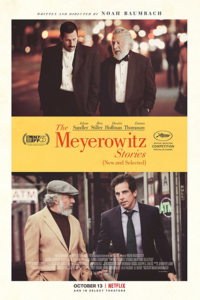
 Writer/director Noah Baumbach tells difficult personal stories. And “Meyeowitz” contains several.
Writer/director Noah Baumbach tells difficult personal stories. And “Meyeowitz” contains several.
When Danny (Adam Sandler) separates from his wife and is forced to move in with his father Harold (Dustin Hoffman) and his step-mother Maureen (Emma Thompson), he’s determined to try to make up for lost time. As one of three of Harold’s children, Danny regrets moving away with his mother and not bonding with his father like his younger brother Matthew (Ben Stiller). Unfortunately, Harold doesn’t hold Danny in very high regard. Maybe it’s because Danny abandoned a possible career in music ultimately marrying and staying at home to raise his daughter Eliza (Grace Van Patten). But Harold’s disappointment with Danny is likely related to the fact that he doesn’t have time to think of anything but himself.
We learn that Harold has been married a number of times. And his relationships produced three very different children. His daughter Jean (Elizabeth Marvel) is a rather stoic woman. Harold mutters about her dismissively, but she’s more complicated than he will ever know. Harold’s perpetually in his own world—a self-obsessed artist, who measures his life not by the living legacy of his children, but by the accolades he never received for his work. Teaching art at the esteemed Bard College was not enough. Harold seeks respect, but above all, he wants love and recognition. His current wife Maureen just wants another drink.
Telling for Harold is when he attends an art exhibit and meets Sigourney Weaver (playing herself). He keeps repeating that he met her, as if it means something. The allure of fame rules him.
“The Meyerowitz Stories” introduces us to a familiar dysfunctional American family unit. And typical for Baumbach there’s a lot of biting humor sandwiched between heaping helpings of angst. But this time, it’s really palatable, mainly because the cast plays off one another so naturally that you are immediately convinced that their characters are related. And the film is, at times, broadly funny, if also very intimate and focused when it matters.
While much of the attention will be paid to Hoffman, who is excellent playing the pompous patriarch, the surprise is Adam Sandler. There are no false voices, no artificial tweaks, just Sandler playing a regular, albeit frustrated, guy. And when he has his moment, it is tear-inducing. His Danny is a good Dad, but a broken son. His revelation is fairly mundane, but nonetheless impactful.
And in Danny, Sandler finds the true heart of the movie. It’s a performance that reminds us of his work in “Punch-Drunk Love” but more gritty and authentic. We know a guy like Danny, a real guy, one with real problems and some life experience that makes him a good listener. There’s some tenderness at work here, and for the often mordant Baumbach to write Sandler such a role completely lacking in affectation and pretense is a rare thing.
Family as a theme for Baumbach always seems personal. For years now, he’s been exploring aspects of family (whether biological or some other incarnation of it) as if trying to work something out. I became familiar with his style in 2005 with “The Squid and the Whale.” And while “Whale” will continue to be my favorite of his films, “Meyerowitz” might be his most accessible as it will connect with many of us who have struggled with relating genuinely to our aging parents and/or our siblings.
Baumbach directs his own material and this affects the editing. I can’t wait to get a copy of the screenplay, because it will be interesting to see if he wrote material in between the cuts. One thing about Baumbach is that he picks up and ends in between. Conversations never seem to conclude and are on-going even as he cuts away to another sequence. The affect is jarring, at first, but once you understand it, I think it is a potential masterstroke. Baumbach respects the viewer and the viewer’s intellect possibly more than any other filmmaker working today.
So, the broad family theme is woven well through several intersecting stories, and we are given credit to think about the stuff in between. And it’s what happens in those moments where Baumbach cuts away that intrigues me. It’s a challenge, but a virtuous one.
